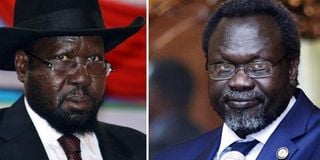Prime
UN urges free campaigning for South Sudan's overdue polls

President Salva Kiir and his rival, Vice President Riek Machar, agreed on the creation of a unified armed forces command, one of several crucial unresolved issues holding up implementation of the 2018 deal to end the country's bloody five-year civil war.
What you need to know:
- South Sudan is due to go to the polls for the first time next year under a peace deal in 2018 that ended a bloody civil war in the world's youngest nation.
All political parties in South Sudan must be able to campaign freely as the troubled country moves towards staging long-overdue elections, the UN envoy urged on Thursday.
South Sudan is due to go to the polls for the first time next year under a peace deal in 2018 that ended a bloody civil war in the world's youngest nation.
But the fragile unity government has failed to meet many key provisions of the agreement and there are still grave doubts in the international community that the election deadline will be met.
"Looking ahead, it will be impossible to envisage a free, fair and credible election in December 2024 unless all South Sudanese parties, leaders and stakeholders (take) the bull by the horns to agree on critical measures by the first quarter of 2024," Nicholas Haysom, the head of the UN mission in South Sudan, told reporters.
"Political parties must be able to register and campaign without intimidation and fear," he said.
"South Sudan needs active participation of civil society so that they can support civil education and function as monitors and observers of a credible process."
Earlier this month, President Salva Kiir, who has ruled the country since independence from Sudan in 2011, restructured a number of state bodies tasked with overseeing the elections.
Last weekend, an alliance of opposition parties staged a rally demanding the right to participate in the elections, but said more time was needed to prepare.
The government, an uneasy alliance between Kiir and his war-era rival Riek Machar, has been accused of quashing political freedoms and failing to meet the conditions for safe elections.
"The institutions that could make the management of elections effective and persuasive to the people of South Sudan will have to be in place... because we don't want elections that would lead to violence," Haysom said.
One of the poorest countries on the planet despite large oil reserves, South Sudan has spent almost half of its life as a nation at war, and has also endured persistent natural disasters, hunger, economic meltdown and communal conflict.
Haysom said the United Nations was concerned about increased violence across the country, particularly involving community-based militias.
There has been a spate of attacks in the disputed Abyei region claimed by both Sudan and South Sudan and the neighbouring Warrap State that Haysom said had claimed at least 75 lives in the last two weeks.





